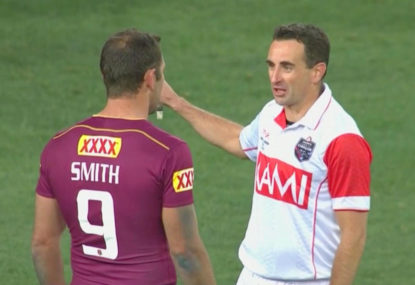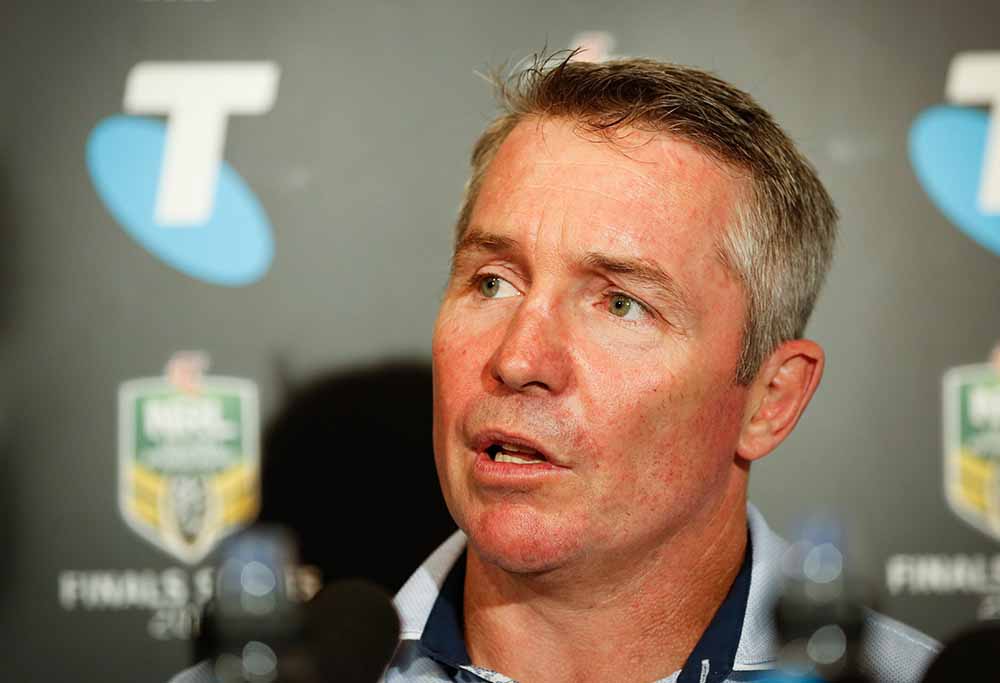NRL Round 7 judiciary: Roosters star duo charged
James Tedesco will be free for the next game of the Sydney Roosters' inconsistent NRL campaign after escaping suspension for tripping Ryan Papenhuyzen. The…

In what should surprise absolutely nobody, the NRL’s referees are in the spotlight following some controversial decisions in the first week of the finals.
The reaction of many (at least, many who don’t support Cronulla or Manly) has been surprisingly negative towards their venting coaches.
For me, the big moment was Todd Greenberg’s decision to impose $50k in fines on the two clubs for their coaches’ outbursts, and the CEO calling out the culture of ‘blame the ref’ in rugby league. I’m not always Greenberg’s biggest fan, but he is 100 per cent correct on this.
To be fair, there’s little doubt that there are aspects of the referees’ collective performance that haven’t been what fans, coaches, players, or the NRL would want. It’s absolutely correct to critique this, and to search for solutions to improve, as much as possible, the standard of officiating in our game.
However, I would like Messrs Flanagan, Barrett, and all other NRL coaches to consider what the impact of the “blame the ref” culture is.
Firstly, it is corrosive to the values of a successful team. Blaming external factors for your own team’s failure takes the focus from what you can control (the team’s performance) to what you can’t (the referees).
The Cowboys under Neil Henry and Paul Green illustrate this. Under Henry, they were on the receiving end of some poor calls in elimination finals (the seven-tackle set incident was particularly bad). Unfortunately, the reaction of the players and coach were those of a club who didn’t want to accept responsibility for their own fate.
Captain Johnathan Thurston went as far to claim a conspiracy to get Sydney teams into the grand final. The focus of that Cowboys team was external, on what was done to them rather than on what they could do to succeed.
Under Green, the Cowboys were eliminated in 2014 by another controversial call, with a strip penalty awarded to the Roosters giving them field position for the winning field goal. Yet Green refused to blame the officials, instead sheeting blame home to his team for having conceded 30 points in the first half of that match.

(AAP Image/Michael Chambers) Y
With Green showing that he was determined to drag his team’s focus onto their own performance, rather than worrying about the referees, it was no surprise that the Cowboys enjoyed their best season ever in 2015, culminating in their maiden premiership.
Given that both the Sea Eagles and Sharks will realistically be seeking to win the premiership in 2018, their coaches would do well to think about what message they’re sending to their players.
Secondly, the ‘blame the ref’ mindset filters down through the grade of rugby league. On this topic, I can speak from some experience, having refereed junior rugby league in Canberra for a number of years.
Almost every referee at every level of the game has a story of abuse. This ranges from the usual “get ‘em onside!” to threats and actual assaults. And I have no doubt that rants by NRL coaches, such as those seen on the weekend, enable this abuse.
Again, ask any referee who has been in the game for a while, and they will tell you that when there are high-profile incidents of players and coaches abusing officials, there is inevitably an increase in similar incidents at the grassroots.
Now, what effect do you think this has on the ability of the Referees’ Associations to retain officials?
It’s a negative. A big negative. What do you think the reaction of a teenager, just new to refereeing, will be when an adult threatens to “knock your effing head off”?
In many cases, they hand back the whistle and find a better way to spend their weekends. And who can blame them?
Those Referees’ Associations are the ones who the game relies on to develop the future NRL referees. From the ranks of local officials are selected those who go on to junior representative, ISC/ISP, and eventually to the NRL.
If you hurt the ability of the game to retain referees at the lower levels, you reduce the talent pool available for the top end of the game.
Overall, the ‘blame the ref’ mindset reduces the ability of the game to attract and retain the future NRL referees, which can only have a negative effect on the level of talent making it to the top. Next time you see some clown giving a teenaged referee a spray, consider that this may be the incident that deprives the game of the next Bill Harrigan in 20 years’ time.
Hopefully, Trent Barrett, Shane Flanagan and their fellow coaches can reflect on the role they play in shaping the culture in rugby league, both within their own clubs, as well as through the grassroots of the game.